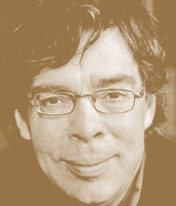Acceptance Speech
Your Majesty, Your Royal Highnesses, members of the Board of the Erasmus Prize Foundation, friends, colleagues and fellow-students:
It is with enormous gratitude that I acknowledge the award of this year’s Erasmus Prize, on behalf of the field of history of science in relation to culture and society.
We have just listened with pleasure to a performance of J.S.Bach’s Well-tempered clavier, with its display of an instrument which could play in tune in all keys. Temperance has been indeed the key to the working of many instruments, and Desiderius Erasmus was perhaps one of the most eminent exponents of the measured judgements of temperance in public life. Previous laureates have therefore often elegantly referred to the works and significance of Erasmus himself. Five centuries ago, somewhere between Rome and Chelsea, he composed his astonishing set of orations in the person of Folly herself. This seems an apt precedent for our own orations here. But sometimes Erasmian temperance seemed to fail. In his Praise of Folly, he ironised with some force on the condition of the sciences. The sciences were a plague of mankind. It was better to live in a state of naturally ignorant innocence than impiously to probe nature’s secrets. Consider the poverty of scholars, gnawing on radishes, fighting off the lice and fleas. And the only sciences, so he joked, which were taken remotely seriously were those which most resembled foolish commonsense: medicine and law.
All this might seem to stand somewhat apart from the admirable terms of the citation of this year?s Erasmus award: the sciences most embody the enlightened ideals of progress and rationality, thus making them the carrier of European socio-cultural identity. The place of the instruments of temperance may seem less clear to us now. So we need now to make sense of how the sciences work and what they mean.
There is perhaps something characteristically Erasmian about the attitude of our field. We agree that there is much to be learnt from the way a society treats its scholars and experts as well as its poor and ill. We agree that what is taken as sacred is too often hedged round with bans on profane and sacrilegious curiosity. And we certainly agree that there are profound relations between our most reliable forms of knowledge and the practices of everyday commonsense. We have sought to show that scientific knowledge is made in local and mundane ways. It depends on no especially inspired nor excessively rational methods. It relies on the tough struggles of persuasion and credibility. The aim has been to get at the cleverly artful work which makes what people know and to understand how that work is organised and challenged.
One of the many pleasures of this year’s Erasmus prize award is the strong sign it offers that the field of social history of science has major importance for public knowledge and contemporary debate. There is an immense public appetite for more reliable knowledge, especially an understanding of the very processes by which this knowledge is produced. Too often this appetite is countered merely with second-rate simplifications in hock to vested interests or to the dictates of the information markets.
Our field offers indispensable resources which can learn from and contribute to the provocative enterprises of museums, exhibitions, electronic media and mature public debate. Our interest in ingenious hardware, in training and recruitment, in publicity and performance, in application and controversy flows from the salient roles of all these features of the life of the sciences. The field depends entirely on the work of many colleagues and students, allies and informants. The principle that knowledge is made through co-operation ought to be illustrated by the way we try to pursue our own work.
To understand, for example, how trust in knowledge is and has been distributed in our society is precisely to engage in some of the most profound contemporary questions of politics and ethics. Reflect on the appalling inequalities in access to knowledge and social resources which dominate the global economy; consider the bellicose assertion of allegedly self-evident principles as the sole basis on which any good society can be organised. Because they help stipulate what is human and what is natural, the sciences are entirely implicated in these conflicts. This is why it matters so much to sustain the conversation about how reliable knowledge works and who can take part in its making.
In his eloquent acknowledgement of the 1990 Erasmus prize he won for his work as archaeologist, my pre-eminent Cambridge predecessor the late Sir Grahame Clark observed that his own work showed how cultural values, rather than what he called mere biological imperatives, governed human development. He insisted that what it was to be human was to engage in cultural choices. This seems to me one of the principal, optimistic, consequences of our own work too. Against a range of fundamentalisms which would stipulate in advance our own natures, we must insist on the freedom to choose the way we live and how we know our world.
I cannot close this acknowledgement of the award of this year’s Erasmus prize without reference to my co-winner. Steven Shapin has for a quarter-century been my guide and colleague, a constant source of wit, acuity, scholarship and sheer commonsense. His ability to communicate in clear, jocular and profound terms has been an inspiration for me, and for many of the colleagues gathered here. He taught me how to work collaboratively and how to think better about what we might otherwise take for granted. Indeed, these principles of straightforward language, collective action and critical scrutiny seem to me to be some of the most important values of the entire field which is rewarded here today.
